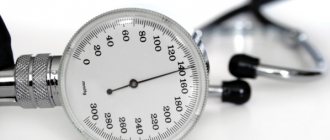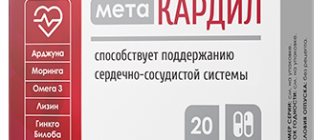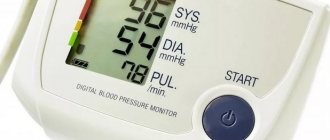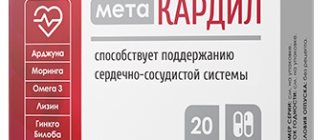Arterial hypertension is one of the most common diseases in all countries of the world. Without treatment, it leads to the development of cardiovascular diseases and increases the risk of myocardial infarction and stroke.
140 over 90 is the pressure at which people usually feel normal. But it is worth paying close attention to such tonometer indicators, since it is from them that the development of hypertension begins. In this article we will tell you in detail about the main reasons for pressure 140 to 90, what to do with such tonometer readings, whether it is necessary to reduce such pressure and how to do it.
What does it mean if blood pressure is 140 to 90 mm. rt. Art?
So, if the tonometer shows blood pressure 140 over 90, what does this mean and should you worry? It often rises to this level during intense physical activity, emotional excitement, or the release of adrenaline into the blood.
But, if an increase occurs without certain reasons, you need to consult a doctor, undergo an examination and carefully follow the recommendations. This pressure serves as the basis for the diagnosis of arterial hypertension of the first degree.
A pressure of 140 over 90 is not a reason to panic, but if your tonometer shows such numbers, do not delay visiting a doctor.
Limits of pressure levels according to the WHO classification in mm of mercury:
- reduced: 110/70;
- normal: 120/80;
- normal limits: 110/70–139/85;
- elevated: 140/90 and above.
A blood pressure of 140 over 90 is borderline and indicates the development of arterial hypertension.
Diagnostics
Diagnosis is carried out under the supervision of a cardiologist and other specialized specialists if there are indications: endocrinologist, nephrologist, neurologist.
The list of studies is standard:
- Oral interview with the patient. The doctor asks the patient about complaints about the condition and records all the data in writing.
- Anamnesis collection. It is important to identify lifestyle, bad habits, diet, and the presence of somatic diseases that could cause an increase in blood pressure.
- Blood pressure level measurement. To establish the fact of a hypertensive process.
- Daily monitoring using an automatic tonometer. It is considered the gold standard for early diagnosis and monitoring of the patient over time.
- Electrocardiography.
- Study of the condition of the heart muscle using a special device (echocardiography).
- Assessment of neurological status.
- Encephalography.
- Study of hormone levels in venous blood (T3, T4, TSH, cortisol and some others).
- Assessing the condition of the kidneys using ultrasound and tests. It is possible to use a tomograph.
- Load tests (conducted with great care).
The examinations are shown in the system.
Causes
The pressure may increase to a level of 140 to 90 due to overwork or emotional stress, especially if it is prolonged. A high level of adrenaline in the blood in risk-related situations also leads to this.
But after proper rest or normalization of the situation in healthy people, the indicators quickly return to normal. It is quite difficult to determine exactly why hypertension develops; a lot depends on:
- general health;
- the patient’s age and lifestyle;
- stress level.
At a young age, the reasons for a pressure of 140 to 90 may be physical inactivity and smoking. At older ages, obesity and poor nutrition take their toll. Constant consumption of foods high in saturated, hydrogenated and trans fats leads to high cholesterol levels, the formation of plaques on the walls of blood vessels and, as a result, to arterial hypertension and the development of cardiovascular diseases. The condition of the kidneys and adrenal glands plays an important role, affecting the production of certain hormones and the removal of fluid from the body.
Doctors identify the following set of factors that influence the development of arterial hypertension:
- genetic predisposition;
- smoking cigarettes and tobacco;
- alcohol abuse;
- high levels of stress in everyday life;
- poor nutrition;
- kidney dysfunction;
- endocrine diseases;
- obesity.
Ways to lower blood pressure
Assessing the risk of complications
The presence of risk factors with a tonometer value of 140/100 increases the possibility of cardiovascular complications several times. In some cases, mild hypertension can lead to the following complications:
- attacks of short-term cerebrovascular accident;
- hemorrhagic or ischemic stroke;
- disorder of myocardial blood supply;
- circulatory disorders in the kidneys;
- vascular hemorrhages in the fundus.
In the presence of concomitant diseases (diabetes mellitus, kidney pathologies), as well as provoking factors (age, physical inactivity, obesity), the risk of complications is critically high.
Is this kind of blood pressure dangerous?
Many people are concerned about the question of whether pressure is 140 over 90 and whether they need to call an ambulance. The answer is no, it is not a reason for panic, our vessels are able to withstand it. During intense physical activity or during times of stress, blood pressure can rise to this level.
But, if this lasts a long time and becomes constant, the cardiovascular system works under increased load, and its functioning gradually deteriorates. This leads to the progression of hypertension and an even greater increase in indicators.
It is dangerous to be inattentive to this condition, because blood pressure can increase even more, for example, with physical or emotional stress. And you can’t put off a visit to the doctor, examination and start of treatment. Hypertension is the main cause of cardiovascular diseases and must be combated at the first manifestations. Without proper treatment, it leads to the following complications:
- enlarged heart;
- heart failure;
- aneurysms of blood vessels and the danger of their rupture;
- renal failure;
- blurred vision;
- cognitive impairment due to deterioration of blood supply to the brain;
- heart attacks;
- strokes.
In men
There are much more men suffering from impotence among those with hypertension than among men with normal blood pressure. Hypertension negatively affects male sexual health.
Erectile function largely depends on the condition of the vessels that fill the spongy and cavernous bodies of the penis with blood. Damage to blood vessels impedes normal blood flow, which leads to insufficient erection.
Hypertension and impotence may be related to one another, for example, hormonal imbalance or the deposition of cholesterol plaques on the walls of blood vessels. To prevent the development of sexual dysfunction, it is important to find out in time about the pressure of 140 to 90 in men and what to do in a particular case for treatment.
During pregnancy
If the pressure is found to be 140 over 90 during pregnancy, what to do in this case? It is necessary to urgently consult a doctor and undergo an examination, as this may indicate the development of severe complications.
A slight increase occurs in the second half of pregnancy due to the appearance of an additional circle of blood flow and an increase in the volume of circulating blood. A pressure of 140 over 90 during pregnancy is the upper limit of normal, but only an experienced doctor can determine the causes, the degree of danger for the mother and fetus, and decide what to do.
Pressure above 140 during pregnancy is dangerous for the mother and fetus and requires seeking medical help at any stage of pregnancy.
A pressure of 140 over 90 during pregnancy may be the first symptom of the onset of gestosis (late toxicosis). It usually develops in the second half of pregnancy and is manifested by hypertension, the appearance of edema and protein in the urine. This is dangerous for the fetus and for the mother, because normal blood circulation in all organs and systems and its flow through the placenta to the fetus are disrupted, resulting in oxygen starvation.
If at 39 weeks of pregnancy the pressure is 140 over 90, early hospitalization in the prenatal department is recommended.
In the elderly
After the age of 65–70, a person’s blood pressure of 140 over 90 is much more common. With age, vessels are increasingly affected by the atherosclerotic process, which leads to a narrowing of their lumen and, consequently, to an increase in blood pressure.
Medications are prescribed to older people with great caution, carefully monitoring the body's reaction. Since the risk of developing complications from the kidneys and other organs is increased, drugs are usually prescribed when systolic pressure is above 140.
High blood pressure treatment
If the pressure has increased one-time, for example, after a severe nervous shock, you can cope with the problem by simply calming down and taking a dose of a sedative. It will not be possible to permanently lower blood pressure, which often rises to critical levels, by taking a few tablets. Complex treatment is required, including:
- taking long-acting antihypertensive medications;
- treatment of concomitant diseases and disorders in the functioning of organs and systems;
- Reasonable physical activity appropriate to age and level of training.
In addition to diuretics, alpha and beta blockers, ATP inhibitors, calcium antagonists, the patient is prescribed physiotherapy that can enhance the effectiveness of therapy. This includes massage, mud therapy, therapeutic baths, acupuncture, etc.
If your blood pressure rises regularly or periodically, you should always have pills on hand that can quickly lower your blood pressure to prevent it from increasing further. The optimal drug, taking into account the course of the disease, is selected by the attending physician. You cannot independently reduce or increase the dosage of drugs that cause a series of side effects.
Regular walks in the fresh air are a way to prevent hypertension
No ads 1
What to do?
If the tonometer first showed a pressure of 140 over 90, what to do in this situation depends on the person’s condition. If you feel normal, it is enough to go to bed and drink mint tea or other soothing herbs. There is no need to rush to take pills if your blood pressure is 140/90, which was discovered for the first time. Perhaps in a couple of hours everything will return to normal without taking strong drugs.
A pressure of 140 over 90 is a reason to buy a tonometer and monitor it daily.
It is necessary to go to the clinic, undergo an examination, find out from the doctor the reasons for the pressure of 140 over 90, what to take to normalize it. After this, carefully follow the doctor's instructions. Patients are usually recommended:
- lose weight;
- stop smoking and drinking alcohol;
- maintain the correct daily routine;
- avoid stress;
- increase physical activity;
- reduce the consumption of salt and foods rich in saturated fats and margarines.
Prevention
Prevention of hypertension must begin with lifestyle correction:
increased physical activity;- weight loss;
- getting rid of bad habits - smoking and alcohol;
- nutrition correction.
Many patients are skeptical about these measures; they believe that they will not help with hypertension. However, the facts of evidence-based medicine indicate the opposite:
- Physical activity, at least 10,000 steps per day, reduces SBP by 5-7 mmHg.
- For every 10 kg decrease in body weight, blood pressure decreases by 10 mmHg.
- Giving up bad habits reduces the likelihood of cardiovascular accidents by 5% over 10 years.
Correction of nutrition is also important; this will help reduce the manifestations of dyslipidemia. It is necessary to give up fatty meats; it is advisable to eat dietary meat 2-3 times a week; on other days, eat fish and seafood.
You should also limit the amount of salt in your diet to 5 g/day. Salt retains water in the body, causing an increase in the volume of circulating blood, as well as swelling of the vascular walls, thereby narrowing their lumen. These are the two main causes of high blood pressure. Reducing salt in the diet is a simple and affordable step that leads to a reduction in blood pressure by 5-10 mmHg.
Salt is added to industrially produced semi-finished products as a preservative, so their consumption should be kept to a minimum.
Your diet should contain a sufficient amount of vegetables and fruits.
Choose mostly non-starchy vegetables, there should be more of them. Recommended intake is 400-500 g per day. And also read on our website: Normal, high and low blood pressure in children 7 years old
Secondary prevention also includes the constant use of medications. Competent adherence to prescribed therapy reduces the risk of hypertensive crises.
What to take?
If blood pressure has increased for the first time, you can try to normalize it without taking medications. You should not self-medicate; you need to undergo a medical examination and get recommendations on what to take if your blood pressure is 140 to 90. First, prepare a decoction of medicinal plants that have a sedative and diuretic effect. Can be used:
- hawthorn;
- valerian;
- peppermint;
- calendula officinalis;
- round-headed Echinops;
- chokeberry;
- lingonberries;
- viburnum;
- oatmeal sheet;
- horsetail
What else to drink for a blood pressure of 140 over 90 if you feel unwell before visiting a doctor? For dizziness, headaches and discomfort in the heart area, you can take a tablet of Validol, Valerian or Corvalol.
Sometimes with hypertension, the heart rate increases, for example, pressure is 140 to 90 and pulse is 90 - what to do in this case depends on the general condition. To begin, lie down on the bed, relax, put a Validol tablet under your tongue and carefully monitor the situation. An increased heart rate is usually associated with the presence of additional pathology, for example, endocrine diseases, anemia, respiratory disorders, oncological processes, so you should not postpone a visit to the doctor.
If after taking the medicine the blood pressure remains 140/90 and the pulse is 90 for 1–2 hours and your health worsens, you need to call an ambulance.
Even more serious symptoms requiring emergency care
- Shortness of breath, suffocation.
- Severe headache, forcing one to take a certain position. It is not relieved by analgesic drugs.
- Back pain accompanied by chest pain.
- Pain behind the sternum is intense, intensifies with breathing and movement.
- Fainting conditions.
- Impaired functioning of the body muscles (shaky gait, difficulty speaking, lack of clarity in the facial muscles).
There is no need to expect the condition to stabilize on its own. A doctor's call is required.
What to drink if your blood pressure persists and does not decrease?
The attending physician will recommend what to drink at a pressure of 140 to 90 constantly, for its stable normalization. But what to do if the pressure persists and does not decrease before visiting a doctor? If you feel unwell, you need to know how to bring down the pressure of 140 to 90.
At home, without prior examination, you can take a diuretic drug, after reading the instructions and determining the dosage.
You can take diuretics constantly only after consulting with your doctor, since taking them leads to the removal of potassium from the body. Diacarb, Hypothiazide, Indapamide, Furosemide, Torasemide are usually used. If you feel worse, you should seek medical help.











